TO
1 - 25 of 22
| Creator | Title | Description | Subject | Date | ||
|---|---|---|---|---|---|---|
| 1 |
 |
Davis, Ryan | "A torrent of words": colonial printers and the public, 1765-1775 | Although printers had long been important in colonial society and politics, it was not until 1765 that they fully realized their potential in shaping colonial attitudes and behavior. With Parliament's institution of the Stamp Act, an outraged public insisted that newspaper publishers assume a more a... | Printing; social aspects; United States; history; 18th century | 2012-05 |
| 2 |
 |
Nagie, Doug | "We go where they go" a history of anti-racist action | Anti-Racist Action was a national network of local anti-racist activist groups that mobilized in North America from 1987 until 2013. It grew from conflict in the Minneapolis punk scene, when an anti-racist skinhead crew of friends called the Baldies organized to eject white-power skinheads from thei... | 2019 | |
| 3 |
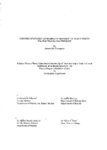 |
Thompson, Geneva EB | A history of interest covergence in University of Utah diversity related policies and programs | This paper will look at the history of interest convergence of the University of Utah Administration hi the implementation of diversity related programs and policies. Diversity programs and policies, especially with the pending ruling on Affirmative Action from the Supreme Court, are continuously un... | University of Utah - Faculty; University of Utah - Students; Affirmative action program in education - Utah - Salt Lake City; Minorities - Education (Higher) - Utah - Salt Lake City | 2013-04 |
| 4 |
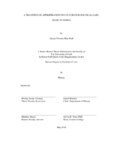 |
Wall, Alyssa Victoria Mae | A tradition of appropriation of culture for political gain: Music in Korea | Although appropriation of music by political organizations and individuals is a practice in no way unique to Korea, analysis of the phenomenon on the peninsula provides valuable insight its strength in real-world political arenas. This project provides an analysis of the appropriation of music for ... | Music - Korea - History; Cultural property | 2016-05 |
| 5 |
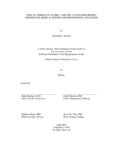 |
Pannier, Samantha T. | African Americans, women, and the 1910 Flexner report: progressive medical reform and professional exclusion | Between the Civil War and the turn of the twentieth century the American medical profession expanded greatly both in size and in attention paid to scientific knowledge. During this time African Americans, women, and even African American women gained access to medical education through the prolifera... | Medicine - Study and teaching - United States; Women in medicine - United States; African Americans in medicine - United States | 2016-04 |
| 6 |
 |
Keate, Max (Makayla) | The American dream: how befief in meritocracy impacts the U.S. prison system | The United States continues to unquestionably violate the human rights of incarcerated individuals. Further, the nation does so with a general disregard to whether or not U.S. prison policies effectively prevent crime or in fact exacerbate it. This paper posits that widespread American belief in rad... | 2023 | |
| 7 |
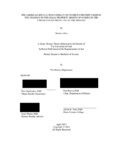 |
Allen, Marina | The American revolution's impact on women's property rights: the changes in the legal property rights of women in the United States from 1765 to the present | This study details the shaping of women's property rights in the United States as it proceeds from the American Revolution. This specific event formed multiple political, social, and legal standards that are both visible and unseen in the postmodern United States. The associated literature for revie... | The American Revolution; women's property rights; paradigm; The United States | 2023 |
| 8 |
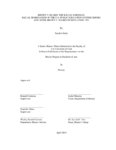 |
Smith, Hayden | Brown v. Board: The racial meridian: Racial segregation in the U.S. public education system before and after Brown v. Board of Education 1954 | The primary concentration of this project is an analysis of post-Brown v. Board segregation issues within the public education sphere. I focus primarily on the legal history of school desegregation in Texas as it is a Southern state with a long history of racial segregation. Furthermore, Texas effec... | Segregation in education - Texas | 2014-04 |
| 9 |
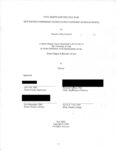 |
Cockrell, Nicholas Allan | Civil Rights and the Cold War: How Racism Undermined United States Leadership on Human Rights | After World War II, the United States found itself in the difficult position of trying to be a human rights leader while also reckoning with its own record on race relations. Trying save its image, the United States entered a propaganda war with the Soviet Union. Throughout the 1950s and 60s, the Un... | 2020 | |
| 10 |
 |
Pace, Andrew Oldroys | The color of reprisal: The complex punishment of collaborators in postwar Europe | As part of the grander program of postwar reconstruction and Denazification, Europe sought recriminations against the men and women in the occupied territories who had accommodated the Germans - obeyed them, worked for them, believed them, killed for them, or even those who had complied by looking t... | Collaborationists - Europe; World War, 1939-1945 - Collaborationists - Europe | 2013-05 |
| 11 |
 |
Quigley, Matthew | Coming out black : race, identity, and coming out | For gay men the coming out process marks their acceptance of and in the gay community. The stories of "coming out" that they tell allow them to share in similar experiences and create a bond that ties them together. These narratives tend to emphasize similar experiences, seen as commonplace to a ful... | African American gay men - Identity; Coming out (Sexual orientation) | 2013-07 |
| 12 |
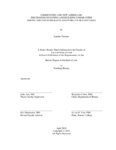 |
Troester, Landon | Communities and New Americans: the Process of Joining and Building Communities Among 1880-1920 Immigrants and World War II Refugees | During the late 19th and early 20th century, the United States faced substantial changes in the nature of European immigration to the country. Unlike previous phases of immigration, many of the European arrivals were from Southern and Eastern Europe, and as a result struggled to identify existing cu... | United States; Displaced Persons; American | 2019 |
| 13 |
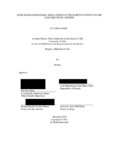 |
Avondet, Callie | Curriculum as resistance: social studies at the Hampton institute in the late nineteenth century | As the Civil War concluded, freed people claimed their freedom to literacy. Schools teaching both basic literacy and offering higher education for Black people were quickly established throughout the South, supported by missionary associations, the Freedmen's Bureau, and Black communities. In 1868 t... | 2022 | |
| 14 |
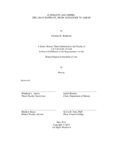 |
Redmond, Nicholas K. | Elephants and empire: The Asian elephant, from Alexander to Akbar | This thesis studies the prominence of the Asian elephant (Elephas maximus maximus) in the historical record. The purpose is to show the impact of elephas on human affairs, most notably in the formation and destruction of empires. Of these empires, two are of primary importance: the conquests of Alex... | Elephants -- War use -- History | 2015-05 |
| 15 |
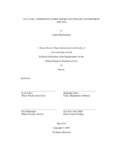 |
Mothershead, Alaina | Gay Cuba: Oppression Under the Revolutionary Government | Following the otherwise socially progressive Cuban revolution, government-sponsored homophobia and anti-gay state-sponsored popular culture constructed a narrative to separate homosexuality from revolutionary modernity and instead associate it with U.S. decadence, therefore justifying the persecutio... | 2019 | |
| 16 |
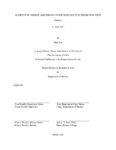 |
Liu, Hans | Glimpses of Chinese and Indian Coolie Resistance in the British West Indies, C. 1834-1917 | Many people are relatively unaware of the hundreds of thousands of indentured workers from China and India, known as coolies, that labored in the British West Indies during and after the end of the trans-Atlantic slave trade between 1834 and 1918. While some scholars have acknowledged the presence o... | 2019 | |
| 17 |
 |
Hanks, Kelley | The multinational company of Jesus: A modern corporation in the early modern world? | There is significant debate concerning whether or not the Company of Jesus should be considered a modern corporation. There are those who support this view, such as Magnus Morner and C.R. Boxer, while others, such as Dauril Alden, are critical of it. Much of the debate is centered on the economic ac... | Jesuits -- History | 2015-04 |
| 18 |
 |
Tran, Kathy Thanh | Reproductive rights of incarcerated women: Disrupting the system in the women's jail | The history of the reproductive rights of incarcerated women and the current trends of mass incarceration demonstrate the prevalence of the hegemonic system that still expects women to embrace a maternal and feminine role. Historically, the United States has incarcerated women because they break awa... | Women prisoners -- Legal status, laws, etc. -- United States; Reproductive rights | 2015-05 |
| 19 |
 |
Prestgard-Duke, Robert | The significance of Chinese nuclear arms to American efforts toward the 1968 treaty of nonproliferation | In the midst of the heightened climate of fear and militarism of the Cold War, an event shocked America and the rest of the world-the Chinese successfully created and exploded a nuclear bomb based on highly enriched uranium on October 16, 1964, at their Lop Nurtest site in Inner Mongolia. The unvei... | Nuclear nonproliferation | |
| 20 |
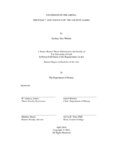 |
Whalen, Zachary | Statesmen in the arena: The policy and politics of the ancient games | The intent of this work is to illuminate the many ways in which policy and politics influenced the games of Ancient Greece and Rome, and to demonstrate their importance in understanding the persistence of the games beyond their religiously driven origins. Utilizing numerous ancient sources, this th... | Olympic games (Ancient); Athletics - Greece - History; Athletics - Rome - History | 2016-04 |
| 21 |
 |
Nakano, Jamie | Tennis players and bowlers: the historical sociology of the CIA | Early CIA case officers recruited during the 1950s were characterized by similar upper-class backgrounds: wealthy families from the Northeast, preparatory school education, a degree from an Ivy League, and previous employment in white collar occupations. Anecdotal evidence reported that the next gen... | 2023 | |
| 22 |
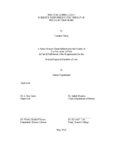 |
Oman, Candace | Who you gonna call?: Domestic responses to the threat of nuclear terrorism | The World Trade Center attacks on September 11, 2001 demonstrated the threat of terrorism in the twenty-first century-and made the prevention of nuclear terrorism all the more pressing. Despite the newfound attention to nuclear terrorism, the possibility of nuclear attacks, and, later, nuclear terro... | History | 2014-05 |
1 - 25 of 22
